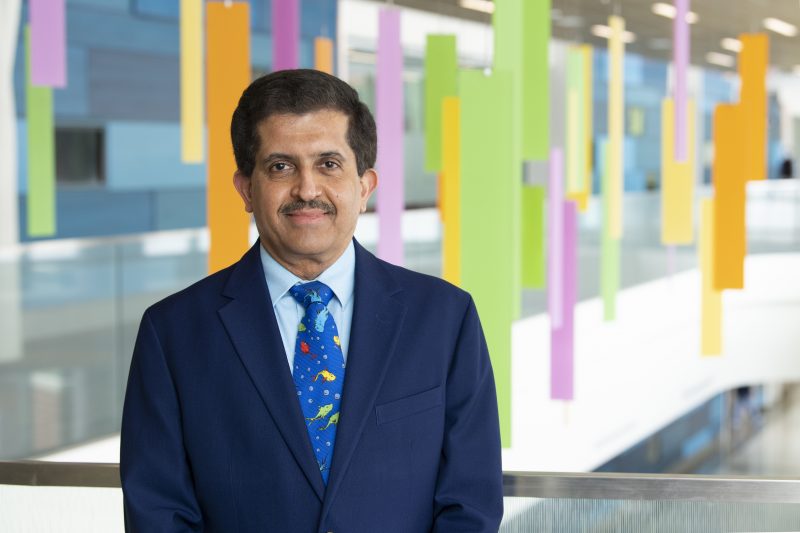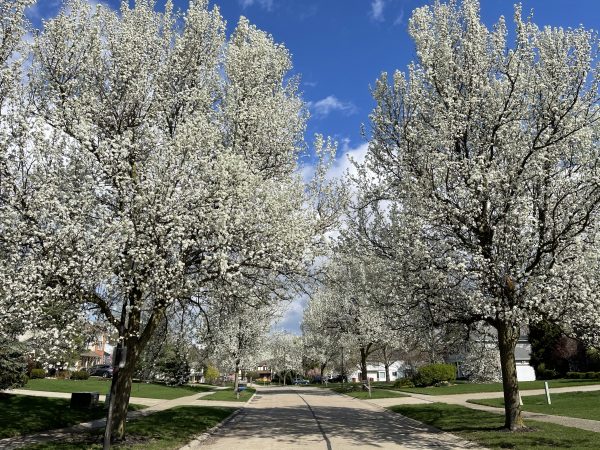
Dr. Naveen Uli is Akron Children’s newest medical director for the Center for Diabetes and Endocrinology.
Dr. Naveen Uli pursues his life just as his heroes’ “Green Revolution” Norman Borlaug and former President Lyndon B. Johnson did: with passion for his work and compassion for his fellow man — or kids, in Dr. Uli’s case.
In fact, he defines success by his ability to reduce the burden of diabetes and other chronic endocrine disorders in his patients and families. It’s a testament to his dedication to helping children get back to what’s most important: being a kid.
As Akron Children’s newest medical director for the Center for Diabetes and Endocrinology, Dr. Uli will oversee the center, while providing high-quality care to patients. His special clinic interests are Prader-Willi syndrome, thyroid disorders and obesity in youth. In his new role, his goal is to provide vision and leadership to expand the reach and range of services to all patients.
Dr. Uli may have heroes of his own, but some just might consider him a hero. After all, his superpower is making a tangible difference in his patients’ lives.
Why did you choose to come to Akron Children’s?
I chose to join Akron Children’s for the opportunities of leadership and professional growth.
Describe your role at Akron Children’s and what you hope to accomplish?
I joined Akron Children’s as medical director for the Center for Diabetes and Endocrinology. I hope to provide vision and leadership to strengthen and expand the reach and spectrum of services we provide. In addition, I hope to raise the stature of our team within the institution and the community.

Dr. Uli is an avid photographer. When he’s not busy treating patients, he can be found snapping pictures of beautiful landscapes.
What is your area of expertise and why did you choose it?
My specialty is pediatric endocrinology and diabetes. While I was in middle school in India in the mid-1970s, my father developed diabetes. Watching him take 2 injections of insulin daily in an era when self-monitoring of blood glucose was nonexistent got me interested in the field of medicine, specifically endocrinology.
What do you like most about being a provider?
The ability to use my knowledge and skills to make a tangible difference in the lives of youth with diabetes and endocrine disorders has been very gratifying.
What unique or different skills do you have that help you practice medicine?
In my more than 20-year career, I have discovered that a ready smile and a sense of humor go a long way in making me a better physician.
What achievements are you most proud of?
As a fellowship director, I helped train and inspire more than 25 pediatric endocrinologists.
What would you most like to change about health care today?
My hope is to untether the connection between health-care coverage/access and employment. This will be the first step toward enabling all individuals in society to benefit from the advances in medical care in an equitable manner.
What medical innovations do you think will have the most impact in the next 5 – 10 years?
Technological advances in diabetes management have occurred at a rapid pace in the past decade. Further innovations in continuous blood-glucose monitoring and automated insulin delivery systems will help reduce daily stress in children with diabetes and their families. It also will empower them to lead lives comparable to their peers.
What does success mean to you?
As an endocrinologist, success means helping reduce the burden of diabetes and other chronic endocrine disorders in my patients and their families.
Where did you grow up?
I grew up in Manipal, a small town on the western coast of south India.
Who makes up your family, including pets and their names?
I live in Solon with Pushpalatha, my wife of almost 30 years. We have 2 adult children. Our son, Nishanth, is in residency training in ophthalmology in Columbus, Ohio. Our daughter, Amala, just started a job as a chemical engineer in Madison, WI.
Who are your heroes and why?
Norman Borlaug, who played a critical role in the “Green Revolution” and helped reduce food insecurity in many continents across the globe, is one of my heroes. His expertise in plant genetics, commitment to social awareness and community engagement, and political savvy benefited a large swath of humankind. His Nobel Peace prize was thus richly deserved. He is truly a “mahatma” (great soul).
Former President Lyndon B. Johnson, who in my opinion is the most underappreciated American president, is another hero of mine. The policies he enacted in civil rights, housing rights, voting rights, Medicare, Medicaid, funding for elementary and secondary education, Head Start, food stamps, Work Study and many more legislative initiatives and programs continue to benefit hundreds of millions of Americans every year.
What’s your favorite quote?
“Before criticizing someone, you should walk a mile in their shoes. That way, when you criticize them, you are a mile away and they have no shoes,” by Jack Handey.
What are your favorite podcasts, books, movies or TV shows?
My favorite TV shows are Jeopardy, Family Feud, Whose Line Is It Anyway, NCIS and FBI.








